日语1994年四级听力
- 格式:doc
- 大小:602.00 KB
- 文档页数:11
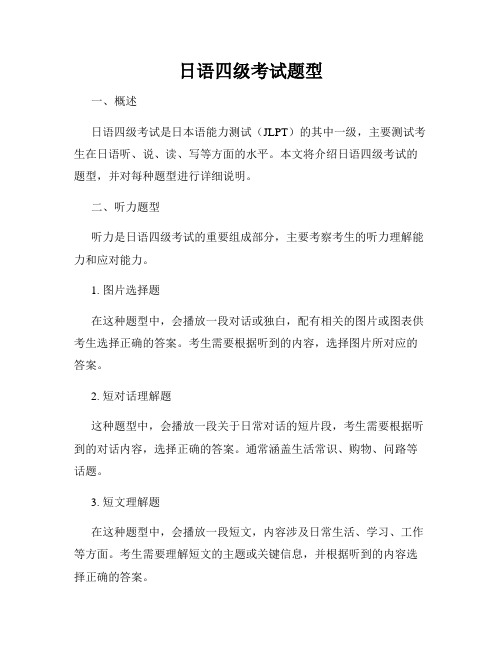
日语四级考试题型一、概述日语四级考试是日本语能力测试(JLPT)的其中一级,主要测试考生在日语听、说、读、写等方面的水平。
本文将介绍日语四级考试的题型,并对每种题型进行详细说明。
二、听力题型听力是日语四级考试的重要组成部分,主要考察考生的听力理解能力和应对能力。
1. 图片选择题在这种题型中,会播放一段对话或独白,配有相关的图片或图表供考生选择正确的答案。
考生需要根据听到的内容,选择图片所对应的答案。
2. 短对话理解题这种题型中,会播放一段关于日常对话的短片段,考生需要根据听到的对话内容,选择正确的答案。
通常涵盖生活常识、购物、问路等话题。
3. 短文理解题在这种题型中,会播放一段短文,内容涉及日常生活、学习、工作等方面。
考生需要理解短文的主题或关键信息,并根据听到的内容选择正确的答案。
三、阅读题型阅读是日语四级考试的另一项重要测试,主要考察考生对日语文章的理解和阅读能力。
1. 单项选择题在这种题型中,会给出一篇短文,考生需要根据短文内容选择正确的答案。
通常涵盖日常生活、社会、文化等多个方面。
2. 完型填空题这种题型中,会给出一篇文章,其中有若干个空格需要填写正确的单词或词组。
考生需要根据上下文和语法规则来选择合适的词语填空。
3. 段落匹配题在这种题型中,会给出若干个短文段落,需要考生将段落与对应的标题进行匹配。
考生需要根据段落的关键信息和主题来选择正确的标题。
四、写作题型写作是日语四级考试的一项重要内容,主要考察考生的写作能力和语法运用能力。
1. 短文写作这种题型中,会给出一个话题,要求考生用日语写一篇短文。
考生需要表达自己对该话题的观点、理由或建议,并正确运用日语语法和词汇。
2. 句子转换题在这种题型中,会给出一句或若干句话,要求考生将其进行句型转换。
考生需要根据语法规则将句子转换成其他形式,例如改变时态、改变语气等。
3. 情景交际题这种题型中,会给出一段对话情景,要求考生编写适当的对话内容。
考生需要根据所给情景和语境来编写对话,并正确运用日语语法和词汇。
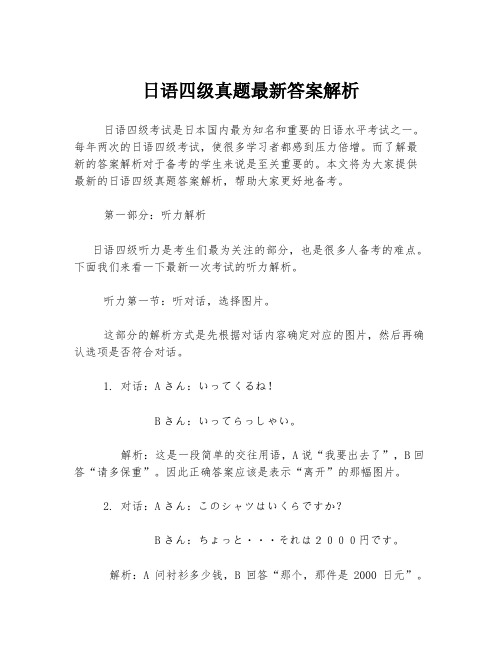
日语四级真题最新答案解析日语四级考试是日本国内最为知名和重要的日语水平考试之一。
每年两次的日语四级考试,使很多学习者都感到压力倍增。
而了解最新的答案解析对于备考的学生来说是至关重要的。
本文将为大家提供最新的日语四级真题答案解析,帮助大家更好地备考。
第一部分:听力解析日语四级听力是考生们最为关注的部分,也是很多人备考的难点。
下面我们来看一下最新一次考试的听力解析。
听力第一节:听对话,选择图片。
这部分的解析方式是先根据对话内容确定对应的图片,然后再确认选项是否符合对话。
1. 对话:Aさん:いってくるね!Bさん:いってらっしゃい。
解析:这是一段简单的交往用语,A说“我要出去了”,B回答“请多保重”。
因此正确答案应该是表示“离开”的那幅图片。
2. 对话:Aさん:このシャツはいくらですか?Bさん:ちょっと・・・それは2000円です。
解析:A问衬衫多少钱,B回答“那个,那件是2000日元”。
根据答语,应该选出表示“价格”的图片。
听力第二节:对话问答这部分的解析方式是根据问题和回答的内容,选择正确的选项。
3. 问题::いつもお母さんが朝ご飯を準備してくれますか?正确答案:Bさん:いいえ、自分で用意します。
解析:问题询问的是“你的妈妈一直给你做早饭吗?”B回答“不,我自己准备早饭。
”因此正确答案应该是表示个人做“饭”的选项。
4. 问题:子供のころ好きだった遊びは何ですか?正确答案:Aさん:アウトドアスポーツが好きでした。
解析:问题问的是“你小时候喜欢的游戏是什么?”A回答“我喜欢户外运动。
”因此正确答案应该是表示“户外运动”的选项。
第二部分:阅读解析日语四级阅读部分也是考试的一个重要组成部分。
下面我们来看一下最新一次考试的阅读解析。
阅读第一节:选择填空这部分的解析方式是根据文章内容和问题要求,选择正确的答案。
5. 文章:旅行会社が毎年発表している「世界のベスト10ビーチ」に、日本のビーチもランキングされている。

1996年日语四级听力1234 5 67 89 1011 12問題I給を見て聞いてください。
正しい答えを一つ選んでください。
1番学生はどのページを開けますか。
女:じゃ、始めましょう。
教科書の百八十四ページを開けてください。
◆学生はどのページをあけますか。
2番テーブルの上に何がありますか。
女:陳さん、新聞を取ってください。
テーブルの上にありますから。
男:ええ、新聞、新聞、新聞はありませんよ。
雑誌と鍵はあるけど。
女:あっ、あった、あった。
ごめんなさい。
ここのカバンの中にありました。
◆テーブルの上に何がありますか。
3番ホテルの人が部屋の場所を教えています、男の人の部屋はどれですか。
女:いらっしゃいませ。
男:すみません、田中ですが。
女:田中さまですね、205号室です。
男:はい。
女:そこの階段で、二階までどうぞ。
男:階段を上がるんですね。
女:はい、そして、左に曲って、右側の三つ目の部屋です。
◆男の人の部屋はどれですか。
4番今日はどんな天気ですか。
男:今日の天気です。
今朝は昨日からの雪がまだ降っていますが、昼頃には止んで、午後は晴れるでしょう。
今日も一日寒い日になるでしょう。
◆今日はどんな天気ですか。
5番タンさんは、今、何をしていますか。
電話のベル……女:もしもし、タンさんをお願いします。
男:あのう、ちょっと、風邪で寝ているんです。
女:ええ?昨日は一緒にテニスをしたんですが。
男:ええ、今朝から、ちょっと……女:大丈夫ですか。
明日はパーティーで歌を歌うと言っていましたが。
男:それがね……◆タンさんは今、何をしていますか。
6番男の人が書いた紙はどれですか。
女:ええっと、まず一番上に自分の名前を書いてください。
片仮名でお願いします、それから、その下にやりたいスポーツを書いてください。
男:はい、空手です。
これも片仮名ですか、漢字ですか。
女:いいえ、平仮名でお願いします。
男:……女:はい、それから、次は自分の住んでいるところを片仮名で書いてください。

問題Ⅰ問題用紙を見て、正しい答えを一つ選んでください。
1番女の人と男の人が絵を見ています。
女の人はどのさかなの絵がすきですか。
女:あっ、さかなの絵ですね。
男:ええ。
どれがいいですか。
女:あちらの飛んでいる絵。
男:いいですね。
たくさんいて、きれいですね。
◆女の人はどのさかなの絵がすきですか。
2番男の人と女の人が話しています。
どの人のはなしをしていますか。
男:で、その男は、どんな服でしたか。
女:背広を着ていました、男:じゃ、ネクタイも?女:いいえ、ネクタイはしていませんでした。
男:そうですか。
◆どの人のはなしをしていますか。
3番タクシーの中で、女の人が男の人に話しています。
タクシーは、どう行きますか。
女:あのう、あそこに大きな木がありますね。
男:はい。
女:あの木の向こうの道を右に曲ってください。
男:はい、分かりました。
木のむこうを右ですね。
女:ええ、そうです。
◆タクシーはどう行きますか。
4番女の人が話しています。
練習はどんな順番でやりますか。
女:今日の練習はいろいろあるから、大変ですよ、はじめに、プールで三十分泳いで、それから自転車で一時間。
そして公園で三十分走ります、ええ、休みはですね、走る前に三十分ぐらい休みましょう。
◆練習はどんな順番でやりますか。
5番女の人男の人がカレンダーを見ながら話しています.二人はいつ食事に行きますか。
女:来週、会社のあとで、一緒に食事に行きませんか。
男:いいですね。
いつがいいですか。
女:月曜か金曜はどうですか。
男:私は、三日から五日まで大阪に行きますが……^女:そうですか。
じゃ、この日でいいですか。
男:はい。
◆二人はいつ食事に行きますか。
6番ひらがなを四つ並べていますどうなりましたか。
女:あっ、できた、横に読むと、「いす」と「とし」です。
男:はい、女:上から下に読むと、「すし」と「いと」です。
男:ああ、できましたね。
◆どうなりましたか。
7番男の人が話しています。
どの絵が正しいですか。

1994年6月大学英语四级(CET-4)真题试卷Part I Listening Comprehension (20 minutes)Section A1. A) His wife doesn’t want him to.B) He will be out of town.C) He has some work to do.D) He doesn’t want to.2. A) Do shopping.B) Make a phone call.C) Take a bus.D) Give them to the woman.3. A) Maria’s friends don’t call her very often.B) Maria likes to talk on the phone with her friends.C) Maria doesn’t like to talk on the phone with her friends.D) Maria doesn’t have any friends.4. A) In October.B) Between April and October.C) In April.D) She isn’t certain.5. A) Once it starts raining, it’ll rain a lot.B) It has been raining for some time.C) They’re ready to catch the train.D) The train has just started off.6. A) He offered her a pencil.B) He was afraid of losing his pen.C) He lent her his extra pen.D) He said he didn’t have any ink.7. A) Bob will be on time.B) She hopes Bob won’t come.C) Bob can’t come.D) Bob will be late.8. A) To the beach.B) To a restaurant.C) To a theatre.D) To the zoo.9. A) Ask the woman to find Mr. White for him.B) Hold the phone.C) Pay the manager a visit.D) Make another call.10. A) She is going to give up biology.B) She spends half of her time on biology and half on math.C) To her match is even more difficult than biology.D) To her biology is difficult, but math is not.Section BPassage OneQuestions 11 to 13 are based on the passage you have just heard.11. A) He had to get a job.B) He was afraid of failure.C) He wanted to join the Army.D) He wasn’t interested in s tudying.12. A) She was shocked.B) She was disappointed.C) She expressed doubts.D) She encouraged him.13. A) He was lucky.B) He had a good wife.C) He was determined.D) He had a good teacher.Passage TwoQuestions 14 to 16 are based on the passage you have just heard.14. A) She was driving along a country road.B) She was lying in a hospital bed.C) She was lying near a lonely road trembling.D) She was telling an astonishing story to a doctor.15. A) She was attacked by robbers.B) She was stopped by a policeman.C) She fainted due to the effects of some drug.D) She was forced to enter a flying saucer.16. A) The woman had been taken a long distance away from her home.B) The woman had intended to leave her husband without telling him.C) The woman had been dishonest to her husband.D) The woman made up an astonishing story.Passage ThreeQuestions 17 to 20 are based on the passage you have just heard.17. A) In the 15th century.B) In the 16th century.C) In the 5th century.D) In the 6th century.18. A) Because it was at the seaside.B) Because it was the only modern building there.C) Because of the beautiful garden in front of it.D) Because of its old style of architecture.19. A) To keep the tourists away.B) To welcome the tourists.C) To make money.D) To warn the tourists not to ruin his garden.20. A) In order to earn more money.B) In order to have more peace.C) In order to welcome more visitors.D) In order to have a bigger garden.Part II Reading Comprehension (35 minutes)Passage OneQuestions 21 to 25 are based on the following passage.The failed Skylab will come screaming home to earth in disappointment sometime next month. But it will fall we know not where.That precise information is beyond even the calculations of scientists and their computers.The best they can tell us is that the space station, weighing 77 tons and as high as a 12 story building, will break into hundreds of pieces that will be scattered across a track 100 miles wide and 4,000 miles long.We are again exposed to one of those unexpected adventures, or misadventures, of science that attracts our attention from the boring routines of daily existence and encourages us to think a lot about man’s future.What worries Richard Smith, the Skylab’s director, is the “big pieces” that will come through the atmosphere, Two lumps, weighing 2 tons each, and ten, weighing at least 1,000 pounds each, will come in at speeds of hundreds of miles an hour and if they crash on land they will dig holes up to 100 feet deep.What worries us, with our lack of scientific knowledge and our quick imagination, is both the big and little pieces, although project officials say there is a very small chance that anyone will be injured by them.That’s good to know, but it doesn’t remove the doubts of the millions who still remember the nuclear accident at Three Mile Island. That accident took place in 1979 in spite of what the officials had assured us as to the safely of the nuclear reactor.21. Where the Skylab will fall?A) is kept secretB) has been made publicC) has been predicted by scientistsD) can’t be predicted even by computers22. According to the passage, what does an incident such as the failed Skylab lead us to do?A) Not to believe in officials.B) To think about our future.C) Has been predicted by scientists.D) To fear for our lives.23. The author suggests that ________.A) the danger of the Skylab’s fall has been overestimatedB) it’s useless to worry over things you can’t do anything aboutC) the danger of the Skylab’s fall has been underestimatedD) computers can solve the problem caused by the broken Skylab24. The author refers to Three Mils Island ________.A) because he is doubtful about what the officials saidB) because he fears that a piece of the Skylab may strike a nuclear power plantC) because he is afraid of the use of nuclear powerD) because the nuclear reactor there and the Skylab were both built by the same company25. This passage is mainly about the author’s ________.A) interest in the failure of the SkylabB) willingness to give his adviceC) eagerness to see more new scientific discoveriesD) concern that science cannot answer all questionsPassage TwoQuestions 26 to 30 are based on the following passage.As supplier of most of the food we eat and of raw materials for many industrial processes, agriculture is clearly an important area of the economy. But the industrial performance of agriculture (the relative efficiency of agricultural production compared to other areas in the economy) is even more important than this. For in nations where theproductivity of farmers is low, most of the working population is needed to raise food and few people are available for the production of investment goods or for other activities required for economic growth. Indeed, one of the factors related most closely to the per capita income (人均收入) of a nation is the fraction of its population engaged in farming. In the poorest nations of the world more than half of the population lives on farms. This compares sharply with less than 10 percent in western Europe and less than 4 percent in the United States.In short, the course of economic development in general depends in a fundamental way on the performance of farmers. This performance, in turn, depends on how agriculture is organized and on the economic environment, or market structure, within which it functions. In the following pages the performance of American agriculture is examined. It is appropriate to begin with a consideration of its market structure.26. This passage is most probably ________.A) a news itemB) part of an introduction to a bookC) part of a lectureD) an advertisement27. What is the most important to agriculture is ________.A) the amount of food it producesB) the per capita income of farmersC) its industrial performanceD) the production of investment goods28. The underlined word “this” in the first paragraph refers to ________.A) the provision of food and raw materialsB) the productivity of farmersC) the production of investment goodsD) the economy as a whole29. The performance of farmers essentially determines ________.A) the size of the working populationB) the organization of agricultureC) the market structureD) the general development of economy30. This passage will most probably be followed by a discussion of ________.A) the structure of American farming populationB) the market structure of American agricultureC) the various functions of American agricultureD) the organization of American agriculturePassage ThreeQuestions 31 to 35 are based on the following passage:Editor:While a new school term is about to begin, perhaps we should reconsider the matter of examinations. In July, two writers (Letters to the Editor) praised the cancellation of exams because they believe “tests don’t tell the whole story.”As a teacher who has worked in four countries, I have had the experience that a student who earns good marks is generally a good student, and that a student’s final mark in a subject is usually a grade average of the year’s work. Of course there are exceptions, but they do not have the frequency that would give an unfair picture of a student’s ability. The simple fact is that proper class work, diligent exam studies and good marks are almost certain indicators of a student’s future performan ce. The opposite is, almost certainly, incompetence.There is no acceptable substitute for competition and examination of quality. How can teachers and future officials determine what a student has learned and remembered? Should we simply take the student’s word for it? Any institutionthat “liberates” students from fair and formal exams is misguided, if not ignorant. And surely the “graduates” of such institutions will lack trustworthiness, not to mention being rejected by foreign universities for graduate or other studies. When all is said and done, I sense that a fear of failure and a fear of unpleasant comparison with others is at the bottom of most ban-exams (废除考试) talk. Excellence and quality fear nothing. On the contrary, they seek competition and desire the satisfaction of being the best.31. Which of the following will the author of this passage probably agree with?A) Tests are not effective in measuring t he students’ abilities.B) Tests are an effective measure of the students’ abilities.C) Tests can only measure some of the students’ abilities.D) Tests may not be useful for measuring students’ abilities.32. The two writers mentioned in the first paragraph ________.A) opposed judging students by the results of examsB) must have proposed other ways of testing studentsC) regarded exams as a way of punishing studentsD) seemed to be worried about the poor marks of their students33. According to the lett er, a student’s final mark ________.A) is often encouragingB) often gives a fair picture of the year’s workC) often proves unreliableD) often tells whether he likes the subject or not34. If a student graduated from a university which does not require exams he would ________.A) have to continue his studiesC) be incompetentB) have a feeling of failureD) not be admitted by foreign institutions35. According to the letter, those who dislike the idea of examinations are probably afraid of ________.A) competing with other studentsC) working too hardB) being graded unfairlyD) being dismissed from schoolPassage FourQuestions 36 to 40 are based on the following passage:Time was—and not so many years ago, either—when the average citizen to ok a pretty dim view of banks and banking. That this was so, it should be said, was to no small extent the fault of banks and bankers themselves. Banks used to be—and a few still are—forbidding (令人生畏的) structures. Behind the little barred windows were, more often than not, elderly gentlemen w hose expression of friendliness reflected the size of the customer’s account, and nothing less than a few hundred thousand in the bank could have inspired the suggestion of a smile.And yet the average bank for many years was, to the average citizen, a fearful, if necessary, instrument for dealing with business—usually big business. But somewhere in the 1930’s banks started to grow human, even pleasant, and st arted to attract the little man. It is possible that this movement beg an in medium-sized towns, or in small towns where people know each other by their first names, and spread to big towns. At any rate, the results have be en remarkable.The movement to “humanize” banks, of course, received a new push during the war, when more and more women were employed to do work previously performed by men. Also more and more “little” people found themselves in need of personal loans, as taxes became heavier and as the practice of installment (分期付款) buying broke down the previously long-held concept that there was something almost morally wrong about being in debt. All sorts of people began to discover that the intelligent use of credit (信贷) could be extremely helpful.36. The author believes that the unfriendly atmosphere in banks many years a go was chiefly due to ________.A) the attitude of bankersB) unfriendliness of customers toward banksC) economic pressure of the timeD) the outer appearance of bank buildings37. The banks of many years ago showed interest only in ________.A) rich customersC) friendly businessmenB) regular visitorsD) elderly gentlemen38. When did banks begin to grow human?A) In the last century.C) Sometime before the war.B) A few years ago.D) During the war.39. What helped the “humanization” of banks?A) The elderly gentlemen in banks were replaced by younger men.B) More and more “little” people became customers of banks.C) More banks were set up in small and medium-sized towns.D) The size of the customer’s account was greatly increased.40. Ordinary people seldom borrowed money from banks in the past because ________.A) the bank buildings looked forbiddingB) they were comparatively rich before the warC) they thought it was not proper to be in debtD) they rarely spent more than they could earnPart III V ocabulary and Structure (20 minutes)41. I don’t know whether what she said is true, but I’ll try to ________ it.A) conformB) confirmC) confessD) confine42. Last year Mike earned ________ his brother, though his brother has a better position.A) twice as much asB) twice as many asC) twice thanD) twice as more as43. If you suspect that the illness might be serious, you should not ________ going to the doctor.A) pick outB) make outC) put offD) give off44. My only purpose was to get shelter ________ the snow, to get myself covered and warm.A) forB) formC) offD) over45. Maggie ran back to the kitchen, eggs ________ carefully in her hands.A) were heldB) to be heldC) heldD) holding46. I have two boys but ________ of them likes sweets.A) bothB) noneC) eitherD) neither47. The man to whom we handed the forms pointed out that they had not been ________ filled in.A) properlyB) regularlyC) thoroughlyD) consequently48. None of the servants were ________ when Mr. Smith wanted to send a message.A) allowableB) approachableC) availableD) applicable49. My sister’s professor had her ________ her paper many times before allowing her to present it to the committee.A) rewriteB) to rewriteC) rewrittenD) rewriting50. After a long and exhausting journey they arrived ________.A) till the lastB) by the endC) at the endD) at last51. His understanding made a deep impression ________ the young girl.A) inB) onC) forD) to52. Silver is the best conductor of electricity, copper ________ it closely.A) followedB) to followC) followingD) being following53. There is hardly an environment on earth ________ some species of animal or other has not adapted successfully.A) as toB) whereverC) so thatD) to which54. It is highly desirable that a new president ________ to this college.A) appointedB) be appointedC) was appointedD) has been appointed55. After searching for half an hour she realized that her glasses ________ on the table all the time.A) were lainB) had been lainC) had been lyingD) would have been lying56. The time has come ________ we can make extensive use of nuclear energy.A) whenB) whileC) asD) since57. Hardly ________ the helicopter ________ when the waiting crowd ran toward it.A) has ... landedB) had ... landedC) would ... landD) was ... landing58. Although the weather was very bad the buses still ran on ________.A) listB) scheduleC) planD) arrangement59. The situation today is obviously quite different from ________ it was only 50 years ago.A) suchB) whichC) whenD) what60. Jane was hit on the head by the robber and was knocked ________.A) mindlessB) unconsciousC) brainlessD) unaware61. The traffic was very heavy, otherwise I ________ here 50 minutes sooner.A) would beB) should beC) had beenD) would have Been62. ________ you decide to take up, you should try to make it a success.A) If onlyB) UnlessC) WhateverD) Whenever63. This bird’s large wings ________ it to fly very fast.A) makeB) causeC) enableD) ensure64. In most of the United States, the morning newspaper is ________ by school-age children.A) directedB) dischargedC) derivedD) delivered65. It was not until be arrived at the station ________ he realised he had forgotten his ticket.A) thatB) beforeC) whenD) after66. Though the long-term ________ cannot be predicted, the project has been approved by the committee.A) effectB) effortC) affectD) afford67. He asked ________ since he had been chairman for seven years.A) not to be re-electedB) to be not re-electedC) not to have been re-electedD) to have not been re-elected68. Only by shouting at the top of his voice ________.A) he was able to make himself hearB) was he able to make himself hearC) he was able to make himself heardD) was he able to make himself heard69. Jane was fairly good at English, but in mathematics she could not ________ the rest of the students in her class.A) put up withB) do away withC) keep up withD) run away with70. He went ahead ________ all warnings about the danger of his mission.A) in case ofB) because ofC) prior toD) regardless ofPart IV Close (15 minutes)One of the most interesting of all studies is the study of words and word origins. Each language is __71__ of several earlier languages and the words of a language can sometimes be traced __72__ through two or three different languages to their __73__ Again a word from one language may pass into other languages and __74__ a new meaning. The word “etiquette,” which is __75__ F rench origin and originally Meant a label (标志), __76__ a sign, passed into Spanish and kept its original meaning. So in Spanish the word “etiquette” today is used to __77__ the small tags (标签) which a store __78__ to a suit, a dress or a bottle. The word “etiquette” in French, __79__, gradually developed a different meaning. It__80__ became the custom to write directions on small cards, or “etiquette”, as to how visitors should dress themselves and __81__ during an important ceremony at the royal court. __82__ the word “etiquette” began to indicate a system of correct manners for people to follow. __83__ this meaning, the word passed into English.Consider the word “breakfast”. “To fast” is to go for some period of time without __84__. Thus in the morning a fter many hours __85__ the night without food, one __86__ one’s fast.Consider the everyday English __87__ “Good-bye”. Many many years ago, people would say to each __88__ on parting “God be with you.” As this was __89__ over and over millions of times, it gradually became __90__ to “Good-bye”.71. A) collectedB) madeC) composedD) contained72. A) toB) onC) inD) back73. A) endsB) backgroundsC) basesD) origins74. A) pickB) developC) changeD) choose75. A) ofB) withC) onD) by76. A) withB) andC) orD) for77. A) showB) designC) holdD) indicate78. A) laysB) attachesC) bindsD) gives79. A) howeverB) moreoverC) thereforeD) furthermore80. A) lateB) latelyC) laterD) latest81. A) respondB) prepareC) actD) follow82. A) ThusB) AlsoC) YetD) Nevertheless83. A) AfterB) WithC) OfD) For84. A) sleepingB) workingC) eatingD) talking85. A) forB) duringC) atD) on86. A) breaksB) continuesC) remembersD) forgets87. A) statementB) expressionC) proverbD) conversation88. A) otherB) personC) oneD) member89. A) reproducedB) revisedC) reviewedD) repeated90. A) combinedB) acceptedC) reformedD) shortenedPart V Writing (15 minutes)1. 人们对职业各有不同的理想2. 我理想的职业是什么3. 我怎样为我理想的职业做准备1994年6月四级参考答案Part I1. A2. B3. D4. B5. C6. C7. A8. C9. D 10. B11. A 12. B 13. A 14. D 15. B16. D 17. C 18. C 19. A 20. DPart II21. D 22. D 23. A 24. B 25. C26. D 27. A 28. C 29. C 30. A31. B 32. D 33. C 34. B 35. A36. D 37. B 38. C 39. B 40. APart III41. A 42. C 43. D 44. D 45. B46. A 47. C 48. A 49. D 50. B51. D 52. A 53. C 54. B 55. C56. D 57. A 58. A 59. D 60. B61. B 62. C 63. B 64. A 65. C66. A 67. B 68. D 69. C 70. DPart IV71. D 72. A 73. C 74. C 75. A76. B 77. C 78. D 79. D 80. A81. B 82. A 83. C 84. B 85. D86. B 87. B 88. D 89. A 90. C范文:Everyone has his own ideal job. Some want to be doctors, some want to be teachers, and some want to be engineers.My ideal job is in teaching. Firstly, I like children very much. I would like to sing, to dance, and to play with them. Secondly, a teacher has two vacations each. I can enjoy myself during the summer and winter holidays. Finally, I want to teach the students all that I know and help them to develop their potential so that they can work better for our country in the future.In order to be a good teacher, I will study hard not only in class, but also in daily life. I will train my patience, improve my handwriting, and enrich my knowledge. In a word, I will study harder than ever to prepare for my future teaching job.。
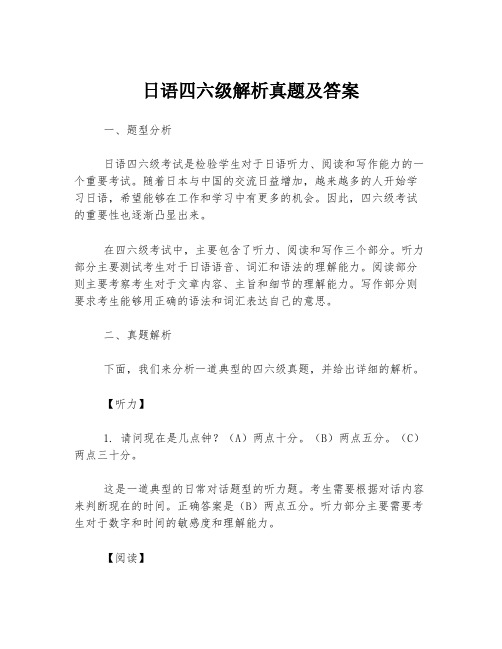
日语四六级解析真题及答案一、题型分析日语四六级考试是检验学生对于日语听力、阅读和写作能力的一个重要考试。
随着日本与中国的交流日益增加,越来越多的人开始学习日语,希望能够在工作和学习中有更多的机会。
因此,四六级考试的重要性也逐渐凸显出来。
在四六级考试中,主要包含了听力、阅读和写作三个部分。
听力部分主要测试考生对于日语语音、词汇和语法的理解能力。
阅读部分则主要考察考生对于文章内容、主旨和细节的理解能力。
写作部分则要求考生能够用正确的语法和词汇表达自己的意思。
二、真题解析下面,我们来分析一道典型的四六级真题,并给出详细的解析。
【听力】1. 请问现在是几点钟?(A)两点十分。
(B)两点五分。
(C)两点三十分。
这是一道典型的日常对话题型的听力题。
考生需要根据对话内容来判断现在的时间。
正确答案是(B)两点五分。
听力部分主要需要考生对于数字和时间的敏感度和理解能力。
【阅读】2. 下面哪个选项是正确的?今天是周末,我正在家里上网冲浪,突然接到了一个电话。
电话那头是我的朋友小明,他邀请我一起去看电影。
我当然愿意,于是我们决定在电影院门口碰面。
可是问题来了,我离电影院还有一段距离,我应该选择什么方式前往呢?(A)步行去电影院,这样既省钱又锻炼身体。
(B)骑自行车去电影院,这样既快又方便。
(C)坐公交车去电影院,这样既舒适又省事。
这是一道常见的选择题型的阅读题。
考生需要根据文章内容来判断应该选择哪种方式前往电影院。
正确答案是(B)骑自行车去电影院,因为既快又方便。
阅读部分主要考察考生对于文章的理解能力以及对于细节的把握能力。
【写作】3. 请列举你最喜欢的日本动漫,并简要介绍一下其内容。
这是一道开放题型的写作题。
考生需要根据自己的喜好来选择最喜欢的日本动漫,并简要介绍一下其内容。
写作部分主要测试考生的语法和词汇运用能力,同时也考察考生对于所选日本动漫的了解程度。
三、答案解析【听力】1. (B)两点五分。
这道题需要考生根据对话中的时间表达方式和数字来判断正确答案。
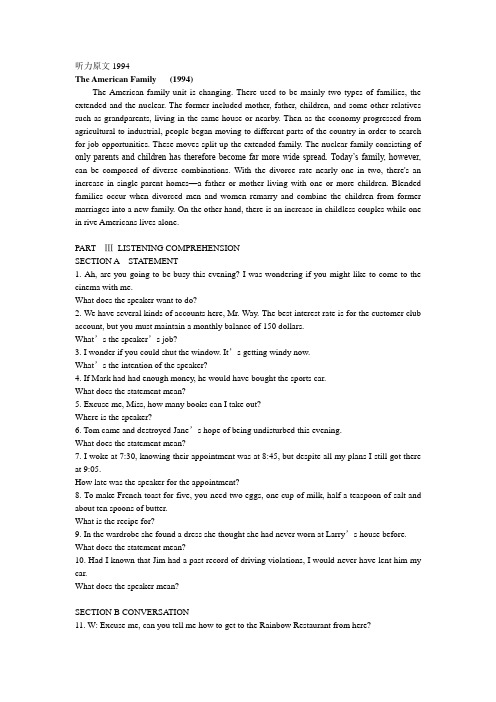
听力原文1994The American Family (1994)The American family unit is changing. There used to be mainly two types of families, the extended and the nuclear. The former included mother, father, children, and some other relatives such as grandparents, living in the same house or nearby. Then as the economy progressed from agricultural to industrial, people began moving to different parts of the country in order to search for job opportunities. These moves split up the extended family. The nuclear family consisting of only parents and children has therefore become far more wide spread. Today’s family, however, can be composed of diverse combinations. With the divorce rate nearly one in two, there's an increase in single-parent homes—a father or mother living with one or more children. Blended families occur when divorced men and women remarry and combine the children from former marriages into a new family. On the other hand, there is an increase in childless couples while one in rive Americans lives alone.PART ⅢLISTENING COMPREHENSIONSECTION A STA TEMENT1. Ah, are you going to be busy this evening? I was wondering if you might like to come to the cinema with me.What does the speaker want to do?2. We have several kinds of accounts here, Mr. Way. The best interest rate is for the customer club account, but you must maintain a monthly balance of 150 dollars.What’s the speaker’s job?3. I wonder if you could shut the window. It’s getting windy now.What’s the intention of the speaker?4. If Mark had had enough money, he would have bought the sports car.What does the statement mean?5. Excuse me, Miss, how many books can I take out?Where is the speaker?6. Tom came and destroyed Jane’s hope of being undisturbed this evening.What does the statement mean?7. I woke at 7:30, knowing their appointment was at 8:45, but despite all my plans I still got there at 9:05.How late was the speaker for the appointment?8. To make French toast for five, you need two eggs, one cup of milk, half a teaspoon of salt and about ten spoons of butter.What is the recipe for?9. In the wardrobe she found a dress she thought she had never worn at Larry’s house before. What does the statement mean?10. Had I known that Jim had a past record of driving violations, I would never have lent him my car.What does the speaker mean?SECTION B CONVERSATION11. W: Excuse me, can you tell me how to get to the Rainbow Restaurant from here?M: Drive two blocks and turn left. Continue on until you reach Heath Street and turn right. Then turn left at the second stop light. You can’t miss it.Q: What should the woman do when she gets to Heath Street?12. M: Weren’t you in class Friday either?W: No, I came down with flu and had to stay in bed.Q: What do we learn from this conversation?13. W: I’m interested in buying one of these machines. Erm, which one would you recommend?M: Oh, this one here, Madam. It has three different programs and can take up three kilos.Q: What is the woman buying?14. W: Operator, can I help you?M: Yes. I’d like to make a collect call. My number is 7683384.W: And the number you’re dialing?M: That’s 7638558. Oh, no, I’m sorry, I forgot it’s just changed. It’s now 7643388.W: Please hold the line, caller.Q: What is the caller’s number?15. W: Yes, is there something wrong?M: I think you’ve made a mistake. This isn’t what I ordered. I asked for the red jacket, not the blue one!Q: What has happened?16. M: I can’t find the instant soup.W: Did you look next to the canned soup?M: Oh, I looked there. But I couldn’t see any on the shelf.W: Why don’t you try the spice section? It ought to be there.Q: Where does the conversation most probably take place?17. W. It’s good to see the sun out again.M: A big improvement on what we’ve been having lately.W: It’s supposed to be cloudy this evening.Q: What would the weather be like this evening?18. W: Where’s the novel that I left on the desk this morning? I have to return it to Mary.M: I gave it to your sister. I’ll get it back for you.Q: Whose novel does the sister have?19. M: Do you rent rooms by the week? You see, I’m not sure whether we will stay for a whole month.W: Well, it’s 30 dollars a week, plus 10 dollars for electricity, but only 130 dollars a month inclusive.Q: How much will the room cost for one month including electricity?20. M: Now Miss, do you feel all right now? What happened?W: Yes, I’m fine now. I just left the motorway. I was driving along the main road when suddenly, right before the crossroad, another car came out the side street. I didn’t see him and he hit me. Q: Where was the other car?SECTION C NEWS BROADCASTNews Item One (21-23)Two European leading automakers, the French Company Renault and Swedish V olvo, have agreed to merge a deal expected to be announced later today, which will create the world’s sixth largest auto producer. Observers said the move will create a European auto giant capable of competing with Japanese imports at a time when new car sales in Europe are declining.21. What has been agreed upon between the two auto companies?22. When is the deal going to be announced?23. Why are the two companies taking such an action?News Item Two (24-26)National law-makers in Ukraine have demanded the President Neonid Chaschoke leave office because of the agreement he reached Friday with Russia.Under the agreement, Ukraine’s nuclear warheads would be transferred to Russia for dismantling and its share of the Black Sea Fleet would come under Russian control. National law-makers said that the deal is a betrayal of Ukraine’s interest. The issue woul d be put to Parliament which was rectified in accord.24. What have the Ukraine’s National law-makers demanded?25. What would happen to Ukraine’s nuclear warheads under the agreement?26. Who has the final word on the agreement?News Item Three (27-28)The United States was expected to press leaders of the new alliance today to establish defenses against the new post-cold-war threat. The US fears that some states could acquire nuclear or chemical weapons and missiles to carry them. Mill has pledged to consider the issue at the summit of alliance leaders on January 10 and 11. U.S. defense secretary Las Aspin was expected to tell the defense minister yesterday that the alliance had good reasons to combat this new post-cold-war threat. The U. S. wants their help and cash to build defense system against ballistic missiles that could hit alliance countries, particularly in Southern Europe. The collapse of the Soviet Union, whi ch has the world’s biggest arsenal weapons of mass destruction, has raised fear that technology for nuclear and chemical arms could now be available on the black market. In an age of shrinking budgets, however, allied leaders are reluctant to spend hundreds and millions of dollars on a new anti-nuclear system when they cannot be assured that there is an immediate threat.27. What does the U. S. think is the new post-cold-war threat?28. Which statement can best express the main idea of this news item?News Item Four (29-30)The World Bank has approved a loan of $ 215 million to help restructure China’s telecommunications system. The project which needs a total finance of $ 623 million will support Beijing’s reform effort in telecommunications and help increase its long-distance and local telephone capacity. Peter Wright, the Bank’s Telecommunications Project engineer, said China has shown dramatic unprecedented growth in telecommunications which, if it continues, will make the sector a case of steady growth by the year 2000. The number of long-distance calls in China grew by 42. 2% from 1989 to 1992, but there are still some 1.6 million people in China who have applied for a phone but have yet to receive it. The Chinese government has embarked on a program to expand and improve telecommunications with planned investment of about $ 25billion between now and 1997.29. In addition to the World Bank’s loan, how much more money does the project require?30. What particular problem is the telecommunications industry currently facing?。
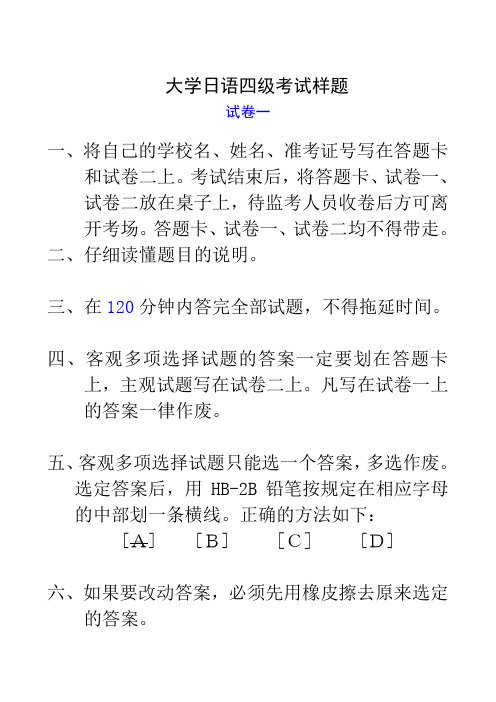
大学日语四级考试样题试卷一一、将自己的学校名、姓名、准考证号写在答题卡和试卷二上。
考试结束后,将答题卡、试卷一、试卷二放在桌子上,待监考人员收卷后方可离开考场。
答题卡、试卷一、试卷二均不得带走。
二、仔细读懂题目的说明。
三、在120分钟内答完全部试题,不得拖延时间。
四、客观多项选择试题的答案一定要划在答题卡上,主观试题写在试卷二上。
凡写在试卷一上的答案一律作废。
五、客观多项选择试题只能选一个答案,多选作废。
选定答案后,用HB-2B铅笔按规定在相应字母的中部划一条横线。
正确的方法如下:[A][B][C][D]六、如果要改动答案,必须先用橡皮擦去原来选定的答案。
七、主观试题用钢笔或圆珠笔书写。
Ⅰ聴解セクション(听解部分)(20分間)これから聞くテストを行います。
一、写真問題(图片题)写真か絵を見て質問に答えてください。
はじめに写真か絵について質問します。
その後で文を四つ言います。
その四つの中から正しい答えを一つ選んでください。
文は1回しか言いません。
まず例題をしてみましょう。
例題[A] [B] [C] [D](可先在试卷上选,然后划到答题卡上,下同。
)答えはAです。
このような問題は1から5まであります。
それでは、問題を始めます。
1.2.3.4.5.[A] [B] [C] [D] [A] [B] [C] [D] [A] [B] [C] [D] [A] [B] [C] [D][A] [B] [C] [D]二、応答問題(应答题)始めに一人が短い文を一つ言う。
その後でもう一人がそれに答える。
正しい答えを[A][B][C][D]から、一つ選んでください。
文は一回しか言いない。
まず例題をしてみよう。
例題[A] [B] [C] [D]答えはAです。
このような問題は6から10まであります。
それでは、問題を始めます。
6.[A] [B] [C] [D]7.[A] [B] [C] [D]8.[A] [B] [C] [D]9.[A] [B] [C] [D]10.[A] [B] [C] [D]三、会話問題(对话题)二人の会話を聞いて、質問に答えてください。

四级能力考试1991年四級文字(1991年)文字.語彙(100点25分)もんだいⅠつぎのぶんののかんじ(かんじとかな)はどうよみますか。
1.2.3.4からいちばんいいものをひとつえらびなさい。
(れい)えんぴつで書いてください。
書いて1きいて2かいて3はいて4といて(かいとうようし) (れい) ①②③④とい1車の中に男の子が何人いますか。
(1)車1しゃ2くるま3ちゃ4くろま(2)中1なか2なっか3ちゅう4ちゅん(3)男の子1おんなのこ2おとこのこ3おどこのこ4おうなのこ(4)何人1なにひと2なんじん3なにじん4なんにんとい2一日は二十四時間です。
そして、一時間は六十分で、一分は六十びょうです。
(1)一日1ついたち2ひとひ3いちじつ4いちにち(2)二十四時間1にじゅうしじげん2にじゅうよんじけん3にじゅうよじかん4にじゅうしじかん(3)一分1いっぷん2いちふん3いちぶ4いちぶんとい3雨の日は外へ出ないで、家でゆっくり休みます。
(1)雨1かぜ2あめ3ゆき4くも(2)外1そと2はか3どこ4うち(3)出ない1いかない2こない3でない4やらない(4)家1へや2しつ3いえ4みせ(5)休み1のみ2たのみ3すみ4やすみとい4先に食べてください。
わたしは後で食べます。
(1)先に1せんに2つぎに3すぐに4さきに(2)食べて1とべて2のべて3たべて4くべて(3)後で1あとで2にちで3ごで4こうでもんだいⅡつぎのぶんののことばはかんじやかなでどうかきますか。
1.2.3.4からいちばんいいものをひとつえらびなさい(れい)つくえのうえに本があります。
うえ1土2干3上4下(かいとうようし) (れい) ①②③④とい1えきのまえでバスをおります。
そして、みなみのほうへ100メートルぐらいいってください。
ひだりがわにおおきいホテルがあります。
(1)まえ1後2前3先4間(2)みなみ1東2西3南4北(3)いって1言って2走って3入って4行って(4)ひだり1左2在3石4右(5)おおきい1高きい2多きい3広きい4大きいとい2ちちのたんじょうびにねくたいとわいしゃつをあげました。
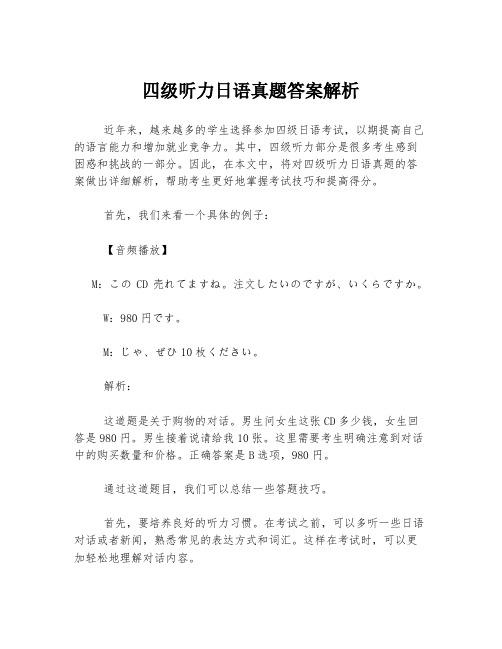
四级听力日语真题答案解析近年来,越来越多的学生选择参加四级日语考试,以期提高自己的语言能力和增加就业竞争力。
其中,四级听力部分是很多考生感到困惑和挑战的一部分。
因此,在本文中,将对四级听力日语真题的答案做出详细解析,帮助考生更好地掌握考试技巧和提高得分。
首先,我们来看一个具体的例子:【音频播放】M:このCD売れてますね。
注文したいのですが、いくらですか。
W:980円です。
M:じゃ、ぜひ10枚ください。
解析:这道题是关于购物的对话。
男生问女生这张CD多少钱,女生回答是980円。
男生接着说请给我10张。
这里需要考生明确注意到对话中的购买数量和价格。
正确答案是B选项,980円。
通过这道题目,我们可以总结一些答题技巧。
首先,要培养良好的听力习惯。
在考试之前,可以多听一些日语对话或者新闻,熟悉常见的表达方式和词汇。
这样在考试时,可以更加轻松地理解对话内容。
其次,注意抓住关键信息。
在听的过程中,不必把每个单词都听明白,关注对话中的关键信息,如数字、价格、时间、地点等。
这些关键信息常常会帮助考生判断正确答案。
此外,要注意倾听语调和重音。
由于日语语调的存在,同一个句子可能有不同的意思。
因此,要通过语调和重音来判断说话者的语气和表达意图。
此外,在做题时,一定要仔细阅读题目。
有时候题目中会包含一些限制条件或者特殊要求,只有仔细阅读问题,才能做出正确的选择。
最后,不要忽视细节。
有时在对话中会出现一些细小的提示,这些细节有可能是正确答案的关键。
比如在购物对话中,要注意人物的购买数量和价格等细节信息。
综上所述,需要考生培养良好的听力习惯,注意抓住关键信息,倾听语调和重音,仔细阅读题目,关注细节等。
通过不断练习和积累经验,相信考生们在四级听力部分能取得更好的成绩。
总之,旨在帮助考生更好地理解和掌握听力技巧,从而提高听力能力和答题准确率。
希望考生们根据以上解析和建议,能够在四级日语考试中取得好成绩,顺利实现自己的目标。

1997年日语四级听力123456789101112問題I絵を見て聞いて下さい。
正しい答えを一つ選んで下さい。
1番女の人は、どんなリンゴをいくつ買いますか。
女:すみません、リンゴをください。
男:はい。
女:大きいリンゴはいくらですか。
男:あれは一つ二百円、三つで五百円。
女:この小さいのは?男:百八十円、五つだと八百円。
サービスです。
女:じゃ、小さいのを五つと大きいのを一つ。
男:小さいのを五つと大きいの一つと、ちょうど千円ですね、ありがとうございました。
◆女の人はどんなリンゴをいくつ買いましたか。
2番部屋を何度にしますか。
女:少し寒いですね。
男:そうですね。
今、部屋は何度ですか。
女:ええと、21度です。
男:もうすこし高くしませんか、3度ぐらい。
女:そうですね。
それじゃ、3度高くしましょう。
男:お願いします。
◆部屋を何度にしますか。
3番女の人がデパートで時計を見ています。
女の人はどの時計を買いますか。
女:すみません、その時計、いくらですか。
男:こちらですか。
女:いいえ、その丸いの隣の。
男:こちらの大きいのですか。
女:ええ。
男:2万5千円です。
女:高いですね。
丸いのの隣の隣のは。
男:一万円です。
女:じゃ、それ、ください。
◆女の人はどの時計を買いますか。
4番ミチ子さんが友達と写真を見ています。
マリさんはどの人ですか。
マリさんです。
女:これ、子供のときの学校の写真なんですけど。
男:ああ、みちこさん、これですか。
女:そうです。
男:髪が長かったんですね。
女:ええ。
マリさんも同じクラスだったんですよ。
男:へえ、分からない。
女:私の後の左から三番めです。
男:ああ、後ですね。
へえ、男の子だと思いました。
女:ええ、今とずいぶん違いますよね。
◆マリさんはどの人ですか。
5番女の人と男の人が絵を見ています。
どの絵を見ていますか。
女:ああ、色がとても綺麗ですね。
男:そうですね。
でも、これは何でしょう。
私は人や花の絵がすきですね。

一级能力考试1994年一級文字(1994年)文字.語彙(100点45分)問題Ⅰ次の文の下線をつけたことばは、どのように読みますか。
その読み方をそれぞれの1.2.3.4から一つ選びなさい。
問1裁判の経緯を見ていると、両者に譲歩の姿勢は全くなく、争いは泥沼の様相を呈している。
(1)経緯AけいかBきょうかCけいいDきょうい(2)譲歩AじょうほBじょうほうCじょうふDじょうぶ(3)争いAきそいBたたかいCうばいDあらそい(4)泥沼AでいじょうBどろじょうCでいぬまDどろぬま(5)様相AようそBようそうCようじょうDようす問2機械が故障するとすぐ廃棄物扱いをする近年の悪癖を解消するには、国民の生活意識を根底から問い直す必要がある。
(1)故障AこしょBこうしょCこうしょうDこしょう(2)廃棄物AはいきぶつBはきぶつCはっきぶつDはつきぶつ(3)悪癖AわるくせBわるへきCあくへきDあっくせ(4)解消AかいしょBかいしょうCげしょDげしょう(5)根底AこんていBこんでいCねそこDねぞこ問3八月半ば、高原には早くも秋の気配が漂い始め、色とりどりの草花が夏の名残を惜しんでいた。
(1)気配AきはいBきばいCけはいDけばい(2)漂いAさまよいBただよいCうるおいDよそおい(3)草花AくさかBそうかCそうはなDくさばな(4)名残AなごりBなのこりCめいさんDめいざん(5)惜しんでAかなしんでBさびしんでCおしんでDあやしんで問題Ⅱ次の文の下線をつけたことばは、ひらがなでどう書きますか。
同じひらがなで書くことばを1.2.3.4から一つ選びなさい。
(1)この会社は多額の負債に苦しんでいる。
A不在B夫妻C風習D封鎖(2)再三注意したが、彼は聞く耳を持てなかった。
A採算B最善C整然D財産(3)こんなことで意地を張っても無駄だ。
A位置B一致C維持D異議(4)顕微鏡で雪の結晶を見る。
A化粧B決勝C傑作D欠席(5)二つの勢力は均衡を保っている。
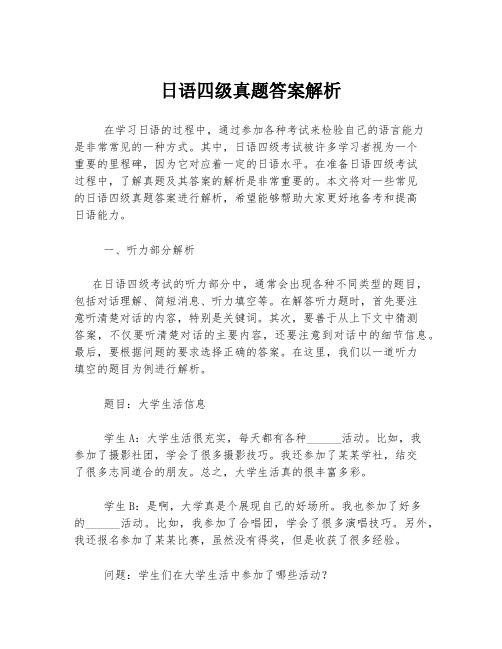
日语四级真题答案解析在学习日语的过程中,通过参加各种考试来检验自己的语言能力是非常常见的一种方式。
其中,日语四级考试被许多学习者视为一个重要的里程碑,因为它对应着一定的日语水平。
在准备日语四级考试过程中,了解真题及其答案的解析是非常重要的。
本文将对一些常见的日语四级真题答案进行解析,希望能够帮助大家更好地备考和提高日语能力。
一、听力部分解析在日语四级考试的听力部分中,通常会出现各种不同类型的题目,包括对话理解、简短消息、听力填空等。
在解答听力题时,首先要注意听清楚对话的内容,特别是关键词。
其次,要善于从上下文中猜测答案,不仅要听清楚对话的主要内容,还要注意到对话中的细节信息。
最后,要根据问题的要求选择正确的答案。
在这里,我们以一道听力填空的题目为例进行解析。
题目:大学生活信息学生A:大学生活很充实,每天都有各种______活动。
比如,我参加了摄影社团,学会了很多摄影技巧。
我还参加了某某学社,结交了很多志同道合的朋友。
总之,大学生活真的很丰富多彩。
学生B:是啊,大学真是个展现自己的好场所。
我也参加了好多的______活动。
比如,我参加了合唱团,学会了很多演唱技巧。
另外,我还报名参加了某某比赛,虽然没有得奖,但是收获了很多经验。
问题:学生们在大学生活中参加了哪些活动?解析:通过分析学生A和学生B的对话,我们可以得知学生A参加了摄影社团和某某学社,而学生B参加了合唱团和某某比赛。
因此,正确答案为“摄影社团、某某学社、合唱团和某某比赛”。
二、阅读部分解析在日语四级考试的阅读部分中,通常会出现多个段落的长篇文章,考察学生的阅读理解能力。
在解答阅读题时,首先要把握文章的整体意思,了解主题和基本逻辑关系。
然后,根据问题的要求在文章中寻找相关信息,并结合自己对文章的理解进行答题。
在这里,我们以一道判断正误的题目为例进行解析。
文章:某某市是一个有着丰富历史文化的城市。
该市拥有许多古老的建筑和博物馆,吸引了大量的游客前来参观。

第一部分日语专业四级考试指南1.1大纲要求高校日语专业四级考试每年6月举行一次。
《高校日语专业四级考试大纲》根据国家教育部发布的《高等院校日语专业基础阶段教学大纲》制定,考试目的是为了检查各高校日语专业对教学大纲的执行情况,特别是教学大纲规定的四级水平所要达到的综合语言技能和交际能力。
考试方式为笔试,兼有客观测试和主观测试两部分。
日语专业四级考试卷面设计听力部分1.考试内容(1)能听懂所用教材或与所用教材同等水平的录音资料。
(2)能听懂讲普通话的日本人以正常语速进行的一般性演讲、报告内容的65%。
另外,能理解包括说话人的语气和态度在内的讲话内容的75%。
(3)听一遍用每分钟240~260字的语速朗读新出单词在10%以下的听力材料后,能把握其主要内容、故事情节等的75%。
(4)能理解中国国际广播电台对日播放的新闻、文化介绍等节目内容的65%以上。
2.命题形式(1)听力理解共20题,分为听解A和听解B。
听解A有15~18道题,听解B有2~5道题。
考试时间为30分钟。
各个小题之间有10秒钟的停顿时间用来选择答案。
(2)听解A以男女二人的对话为主,对话内容一般在15句以下。
题材以日常生活为主,涉及衣食住行、家庭生活、学习工作等各方面。
(3)听解B以单人的演讲、报告或说明为主,约10句话左右。
内容多与日常生活相关,涉及人物介绍、行为安排或对某一事件的概括、感想等。
文字词汇部分1.考试内容(1)对文字的测试内容主要是能写出《基础阶段教学大纲》词汇表中所规定的日语汉字的正确读者以及根据读音写出相应的汉字。
掌握常用日语汉字的音读、训读以及特殊读音。
(2)对词汇的测试范围主要包括教学大纲以及四级考试大纲里包含的约5500个词汇。
2.命题形式文字试题共10道,包括根据汉字选择正确的读音以及根据读音选择正确的汉字。
词汇试题共15道,包括对某个单词的考查以及对固定搭配、惯用句等的考查。
语法部分1.考试内容日语专业四级考试语法部分主要考查以下几个方面的内容:(1)对于格助词、副助词、终助词、接续助词等助词的理解和运用能力。

1994年日语四级听力123456789問題Ⅱ123456問題Ⅲ絵などはありません問題I絵を見て正しい答えを一つ選んでください。
では、一度練習をしましょう。
1番今何時ですか。
女:すみません、今何時ですか。
男:えーと、3時、いや4時15分です。
女:4時15分ですね。
男:ええ。
女:どうも。
◆今何時ですか。
2番男の人はどのカメラを見せますか。
女:すみません、あのう、一番右のカメラを見せてください。
男:はい一番右のですね。
女:ええ。
◆男の人はどのカメラを見せますか。
3番お母さんが子供に頼んでいます。
男の子は何をいくつ買いますか。
母:じゃ、買い物に行ってきて。
男の子:ああ。
母:リンゴを五個と牛乳を三本、お願いね。
男の子:ああ、わかった。
リンゴ五つし牛乳三本だね。
母:そう。
◆男の子は何をいくつ買いますか。
4番女の人のノートはどれですか。
女:あれ、私のノートを見ませんでしたか。
男:ノート、どんなのですか。
女:えーと、白い花がたくさんかいてあるんですけど。
◆女の人のノートはどれですか。
5番男の人と女の人が話しています、男の人の先生はどの人ですか。
男:あれ。
女:なに。
男:うちの学校の先生だ。
あの雑誌を読んでる人。
女:ええ?きれいな人ね。
男:うん、男の人だよ。
◆先生はどの人ですか。
6番女の人が郵便局の入口にいます。
女の人はどこへ行きますか。
女:すみません、フランスに手紙を出したいんですが。
男:ああ、手紙はあそこですよ。
あの背の高い女の人と子供がいるところです。
女:あ、ありがとうございます。
◆女の人はどこへ行きますか。
7番お医者さんの話を聞いてください。
薬をどう飲みますか。
医者:えー、この丸い薬はご飯を食べる前に一つ飲んでください。
男:丸いのを一つですね。
医者:えー、こちらは食べたあとに二つです。
いいですね。
男:はい。
◆薬をどう飲みますか。
8番山田さんはどの人ですか。
男:ねね、山田さんって、どの人?女:先生の前に、女の子がいるでしょう。
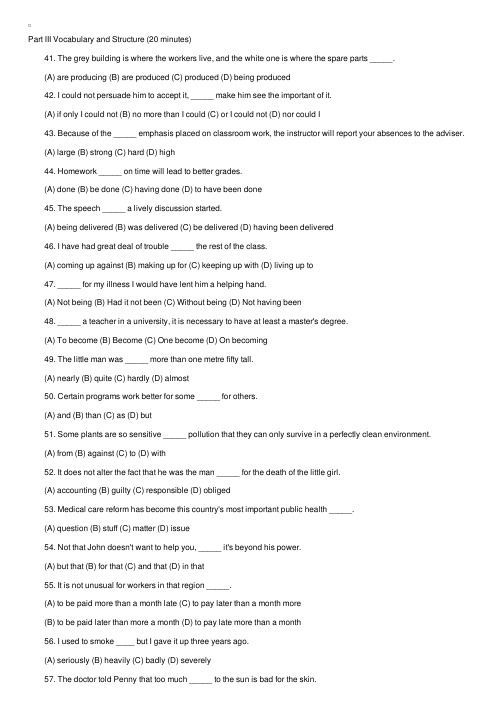
Part III Vocabulary and Structure (20 minutes) 41. The grey building is where the workers live, and the white one is where the spare parts _____. (A) are producing (B) are produced (C) produced (D) being produced 42. I could not persuade him to accept it, _____ make him see the important of it. (A) if only I could not (B) no more than I could (C) or I could not (D) nor could I 43. Because of the _____ emphasis placed on classroom work, the instructor will report your absences to the adviser. (A) large (B) strong (C) hard (D) high 44. Homework _____ on time will lead to better grades. (A) done (B) be done (C) having done (D) to have been done 45. The speech _____ a lively discussion started. (A) being delivered (B) was delivered (C) be delivered (D) having been delivered 46. I have had great deal of trouble _____ the rest of the class. (A) coming up against (B) making up for (C) keeping up with (D) living up to 47. _____ for my illness I would have lent him a helping hand. (A) Not being (B) Had it not been (C) Without being (D) Not having been 48. _____ a teacher in a university, it is necessary to have at least a master's degree. (A) To become (B) Become (C) One become (D) On becoming 49. The little man was _____ more than one metre fifty tall. (A) nearly (B) quite (C) hardly (D) almost 50. Certain programs work better for some _____ for others. (A) and (B) than (C) as (D) but 51. Some plants are so sensitive _____ pollution that they can only survive in a perfectly clean environment. (A) from (B) against (C) to (D) with 52. It does not alter the fact that he was the man _____ for the death of the little girl. (A) accounting (B) guilty (C) responsible (D) obliged 53. Medical care reform has become this country's most important public health _____. (A) question (B) stuff (C) matter (D) issue 54. Not that John doesn't want to help you, _____ it's beyond his power. (A) but that (B) for that (C) and that (D) in that 55. It is not unusual for workers in that region _____. (A) to be paid more than a month late (C) to pay later than a month more (B) to be paid later than more a month (D) to pay late more than a month 56. I used to smoke ____ but I gave it up three years ago. (A) seriously (B) heavily (C) badly (D) severely 57. The doctor told Penny that too much _____ to the sun is bad for the skin. (A) exposure (B) extension (C) exhibition (D) expansion 58. Michael used to look hurt and surprised when _____. (A) scolding (B) to scold (C) having scolded (D) scolded 59. He decided to make further improvements on the computer's design _____ the light of the requirements of customers. (A) on (B) for (C) in (D) with 60. If you don't like to swim, you _____ stay at home. (A) should as well (B) may as well (C) can as well (D) would as well 61. To be frank, I'd rather you _____ in the case. (A) will not be involved (B) not involved (C) not to be involved (D) were not involved 62. If you suspect that the illness might be serious you should not _____ going to the doctor. (A) put off (B) hold back (C) put aside (D) hold up 63. If you want to know the train schedule, please _____ at the booking office. (A) acquire (B) inquire (C) request (D) require 64. He thought that _____. (A) the effort doing the job was not worth (C) it was not worth the effort doing the job (B) the effort was not worth in doing the job (D) it was not worth the effort by doing the job 65. The coming of the railways in the 1830s _____ our society and economic life. (A) transformed (B) transported (C) transferred (D) transmitted 66. I have no objection _____ the evening with them. (A) to spend (B) to spending (C) of spending (D) spending 67. Realizing that he hadn't enough money and _____ to borrow from his father, he decided to sell his watch. (A) not wanted (B) not to want (C) not wanting (D) wanting not 68. In preparing scientific reports of laboratory experiments, a student should _____ his findings in logical order and clear language. (A) furnish (B) propose (C) raise (D) present 69. _____ they reached the centre of the city, they stopped the car at a bar. (A) Before a mile or so when (C) Further than a mile or so (B) For a mile or so after (D) A mile or so before 70. They are teachers and don't realize _____ to start and run a company. (A) what it takes (B) what takes it (C) what they take (D) what takes them。

1994年1月大学英语四级(CET-4)听力Part I Listening Comprehension (20 minutes)Section A1. A) Once a week. B) Twice a week.C) Three times a week. D) Four times a week.2. A) He left his notes at home. B) He doesn’t know where his notes are.C) He doesn’t want to lend his notes to the woman. D) He agrees to lend her his notes.3. A) He will go in spite of the cold weather. B) He won’t go since he is not feeling well.C) He will go when he feels better. D) He won’t go as he hasn’t finished his work.4. A) Check the timetable. B) Go to the railway station earlier.C) Travel on a later train. D) Cancel the trip earlier.5. A) In New Y ork. B) In Boston.C) In Newport. D) In Washington.6. A) A clerk at the airport information desk. B) A clerk at the railway station information desk.C) A policeman. D) A taxi-driver.7. A) A guest and a receptionist. B) A passenger and an air hostess.C) A customer and a shop assistant. D) A guest and a waitress.8. A) He’s better. B) He’s feeling worse.C) He’s sick in bed.D) He has recovered.9. A) The man didn’t wa nt the woman to have her hair cut.B) The woman followed the man’s advice.C) The woman is wearing long hair now.D) The man didn’t care if the woman had her hair cut or not.10. A) He will return from Paris in two weeks. B) He is studying French in Paris.C) He is having a vacation in Paris. D) He is planning to go back to Paris in a year.Section BPassage OneQuestions 11 to 14 are based on the passage you have just heard.11. A) Washing plates. B) Clearing tables.C) Shining shoes. D) Sweeping the floor.12. A) He must work six days a week. B) He should never be late for work.C) He must study hard in his spare time. D) He should not bring his friends to the restaurant.13. A) To pay him for his work. B) To let him have 3 meals a day in the restaurant.C) To give his friends free drinks. D) To allow him to have more free time.14. A) Because the boy was not a full-time worker.B) Because the boy had made some mistakes.C) Because he thought the boy had failed to meet his requirements.D) Because he thought it was his son who should pay him.Passage T woQuestions 15 to 17 are based on the passage you have just heard.15. A) Watching traditional plays. B) Visiting the magnificent libraries.C) Boating on the river. D) Cycling in narrow streets.16. A) There are many visitors there. B) There are many students there.C) There are many old streets there. D) There are many bicycles there.17. A) He thinks the city is too crowded. B) He likes the place very much.C) He thinks the streets are too narrowD) He admires the comfortable life of the students there.Passage ThreeQuestions 18 to 20 are based on the passage you have just heard.18. A) He was good at writing about interesting people.B) It was much easier to write stories about people.C) He believed that people are always easier to learn about other people.D) He thought people played an important role in world events.19. A) Action. B) World News. C) Enterprise D) Faces and places.20. A) He is a sportsman. ) He is an actor. C) He is a photographer. D) He is a publisher.1994年1月四级听力参考答案:1. C2. D3. B4. C5. D6. A7. B8. A9. A 10. B11. C 12. B 13. A 14. D 15. C16. D 17. B 18. C 19. A 20. D1994年1月大学英语四级(CET-4)听力原文Section A1. M: Y our son seems to have made much progress in playing the piano. Does he attend any piano classes?W: Y es, he takes lessons twice a week, but from next week on, he will go to the class on Saturday evenings too.Q: How often will the woman`s son have piano lesson from next week on?2. W: Do you mind if I borrow your notes?M: No, of course not. They are on my desk.Q: What does the man mean?3. W: Would you like to go to the dance with me tonight?M: I`d love to, but I`m just getting over my cold.Q: Will the man go dancing with the woman tonight?4. W: I`m afraid we are going to miss the 3-o`clock train.M: Don`t worry. We can get our tickets changed for this evening.Q: What does the man suggest they should do?5. W: Do you enjoy life in Washington?M: Yes, indeed. I`m planning to move to New Y ork or Boston. Anyway, I`ve never regretted my earlier decision.Q: Where does the man live now?6. W: Could you please tell me if Flight 858 from San Francisco will be on time?M: Y es, Madam. It should be arriving in about 10 minutes.Q: Who do you think the woman is talking to?7. M: Sorry to trouble you. But is there any possibility of borrowing a blanket? I feel cold.W: I think we`ve got one. Could you wait until after take-off please?Q: What is the probable relationship between the two speakers?8. W: I heard you caught a cold. How are you feeling today?M: I can`t complain. At least I`m out of bed.Q: How is the man today.9. W: I wish my hair was longer.M: Y es, pity you had it cut. If only you`d listened to me.Q: What can we learn from the dialogue?10. W: Has Andrew come back from his trip to Paris?M: Y es, and he liked it so much that after only two weeks at home, he went back to study French for a year.Q: What does this conversation tell us about Andrew?Section BPassage One :My parents ran a small restaurant. The restaurant was open 24 hours a day, seven days a week. And my first job when I was six years old was shining shoes for customers. My duties increased as I grew older. By age ten I was clearing tables and washing plates. My father made it clear that I had to meet certain standards. I had to be on time, hard-working and polite to the customers. I was never paid for any work I did. One day I made a mistake of telling Dad I thought he should give me 10 pounds a week. He said, "Ok, then how about you paying me for the three meals a day when you eat here and for the times you bring in your friends for free drinks." He figured I owed him about 40 pounds a week. This taught me quite a lot.Questions 11 to 14 are based on the passage you have just heard.11. What was the speaker`s job before he was 10 years old?12. What was one of the requirements laid down by the boy`s father?13. What did the boy ask his father to do one day?14. Why did the boy`s father refuse to pay him?Passage T wo :Cambridge is about 90 kilometres northeast of London. It is one of most beautiful places in Britain. Everything about the city of Cambridge reminds you of its famous university: student on bicycles, an atmosphere of learning, traditions and the magnificent buildings of the 30 colleges that are in the University of Cambridge. Most of the colleges stand on the bank of the Cam River a gentle river that flows through the heart of the city. Tourists and students like boating in a kind of flatbottom boat to see the colleges or to relax themselves. If the water traffic reminds the visitor of V enice, the road traffic is more likely to recall Beijing or Amsterdam. The streets are full of bicycles, hundreds and hundreds of them. They provide a cheap form of transport for the students and very conveniently of getting around the Cambridge`s nearer streets.Questions 15 to 17 are based on passage you have just heard.15. What do tourists enjoy doing in Cambridge for relaxation?16. Why does the road traffic in Cambridge remind one of Beijing?17. What is the speaker`s impression of Cambridge?Passage Three :Mr. Foster started his publishing business with only one magazine. It was called "World-news". Mostly it had summaries of important week events from around the world. But it always included one or two stories about interesting people. Mr. Foster put these in because he believed all people like to read about other people. Several years ago, Mr. Foster started two other magazines. One was called "Enterprise". It is for business people. And the other was called "Action", for sportsmen. Like "Worldnews", they always have two or three stories about interesting people. Five years ago. Mr. Foster got another idea for a magazine. He wanted this one to have even more stories about people than the others and to have more photographs. This one was named "Faces and Places". From the very beginning, it was a big success.Questions 18 to 20 are based on the passage you have just heard.18. Why did Mr. Foster add stories about interesting people to the magazine "Worldnews"?19. Which magazine is a sportsman most likely to buy?20. What is Mr. Foster`s profession?。
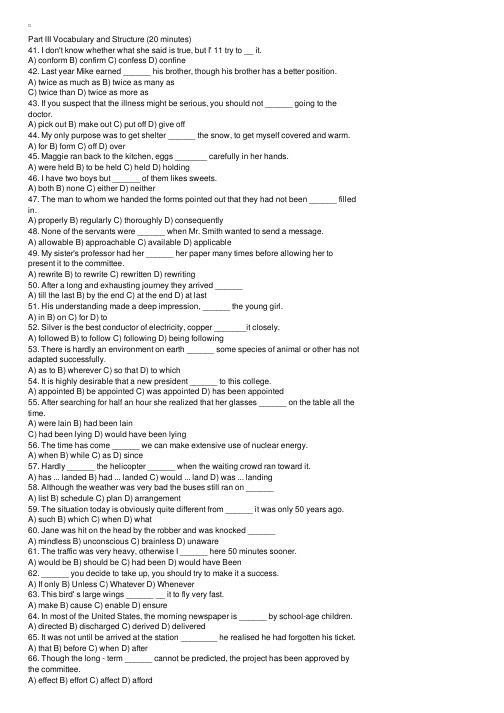
Part III Vocabulary and Structure (20 minutes)41. I don't know whether what she said is true, but I' 11 try to __ it.A) conform B) confirm C) confess D) confine42. Last year Mike earned ______ his brother, though his brother has a better position.A) twice as much as B) twice as many asC) twice than D) twice as more as43. If you suspect that the illness might be serious, you should not ______ going to the doctor.A) pick out B) make out C) put off D) give off44. My only purpose was to get shelter ______ the snow, to get myself covered and warm.A) for B) form C) off D) over45. Maggie ran back to the kitchen, eggs _______ carefully in her hands.A) were held B) to be held C) held D) holding46. I have two boys but ______ of them likes sweets.A) both B) none C) either D) neither47. The man to whom we handed the forms pointed out that they had not been ______ filled in.A) properly B) regularly C) thoroughly D) consequently48. None of the servants were ______ when Mr. Smith wanted to send a message.A) allowable B) approachable C) available D) applicable49. My sister's professor had her ______ her paper many times before allowing her to present it to the committee.A) rewrite B) to rewrite C) rewritten D) rewriting50. After a long and exhausting journey they arrived ______A) till the last B) by the end C) at the end D) at last51. His understanding made a deep impression, ______ the young girl.A) in B) on C) for D) to52. Silver is the best conductor of electricity, copper _______it closely.A) followed B) to follow C) following D) being following53. There is hardly an environment on earth ______ some species of animal or other has not adapted successfully.A) as to B) wherever C) so that D) to which54. It is highly desirable that a new president ______ to this college.A) appointed B) be appointed C) was appointed D) has been appointed55. After searching for half an hour she realized that her glasses ______ on the table all the time.A) were lain B) had been lainC) had been lying D) would have been lying56. The time has come ______ we can make extensive use of nuclear energy.A) when B) while C) as D) since57. Hardly ______ the helicopter ______ when the waiting crowd ran toward it.A) has ... landed B) had ... landed C) would ... land D) was ... landing58. Although the weather was very bad the buses still ran on ______A) list B) schedule C) plan D) arrangement59. The situation today is obviously quite different from ______ it was only 50 years ago.A) such B) which C) when D) what60. Jane was hit on the head by the robber and was knocked ______A) mindless B) unconscious C) brainless D) unaware61. The traffic was very heavy, otherwise I ______ here 50 minutes sooner.A) would be B) should be C) had been D) would have Been62. ______ you decide to take up, you should try to make it a success.A) If only B) Unless C) Whatever D) Whenever63. This bird' s large wings ______ __ it to fly very fast.A) make B) cause C) enable D) ensure64. In most of the United States, the morning newspaper is ______ by school-age children.A) directed B) discharged C) derived D) delivered65. It was not until be arrived at the station ________ he realised he had forgotten his ticket.A) that B) before C) when D) after66. Though the long - term ______ cannot be predicted, the project has been approved by the committee.A) effect B) effort C) affect D) afford67. He asked ______ since he had been chairman for seven years.A) not to be re-elected B) to be not re-electedC) not to have been re-elected D) to have not been re-elected68. Only by shouting at the top of his voice ______A) he was able to make himself hear B) was he able to make himself hearC) he was able to make himself heard D) was he able to make himself heard69. Jane was fairly good at English, but in mathematics she could not ______ __ the rest of the students in her class.A) put up with B) do away with C) keep up with D) run away with70. He went ahead ________ all warnings about the danger of his mission.A) in case of B) because of C) prior to D) regardless of。
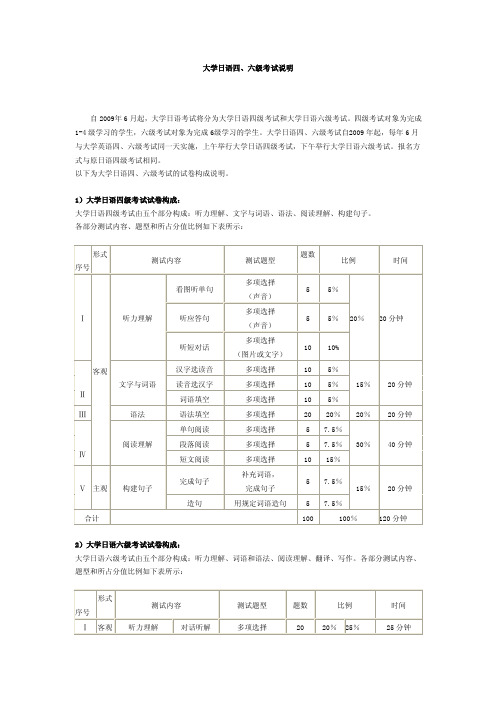
大学日语四、六级考试说明
自2009年6月起,大学日语考试将分为大学日语四级考试和大学日语六级考试。
四级考试对象为完成1-4级学习的学生,六级考试对象为完成6级学习的学生。
大学日语四、六级考试自2009年起,每年6月与大学英语四、六级考试同一天实施,上午举行大学日语四级考试,下午举行大学日语六级考试。
报名方式与原日语四级考试相同。
以下为大学日语四、六级考试的试卷构成说明。
1)大学日语四级考试试卷构成:
大学日语四级考试由五个部分构成:听力理解、文字与词语、语法、阅读理解、构建句子。
各部分测试内容、题型和所占分值比例如下表所示:
2)大学日语六级考试试卷构成:
大学日语六级考试由五个部分构成:听力理解、词语和语法、阅读理解、翻译、写作。
各部分测试内容、题型和所占分值比例如下表所示:。